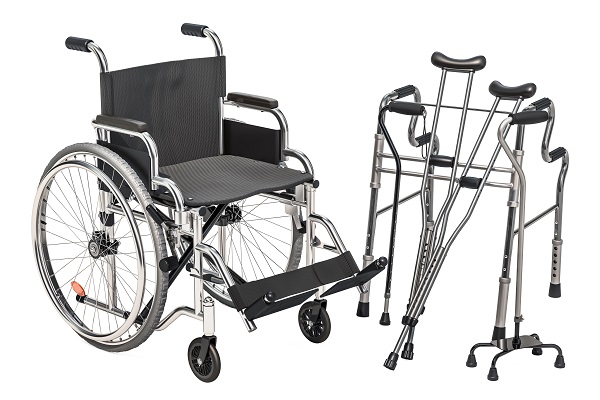Hospital admissions can be very hectic and loaded with paperwork, information, and stress. Although some people plan for surgeries and other procedures, most people do not plan to get admitted to the hospital. Oftentimes patients are thrown into an unfamiliar environment and left wondering what to expect.
In my previous blog titled “ Discharge Planning Acute Care Physical Therapy: Preparing For Discharge Home From Rehab (LINK), “, I give a few points on how to make a smoother transition back to home. In this blog, I would like to turn the tables and discuss (5) ways that you can prepare for admission into the hospital or rehabilitation facility.
Regardless if you are staying for a few days or months, hopefully, you find these points particularly helpful for your situation.
#1 HAVE SOMEONE BRING CLOTHING AND OTHER PERSONAL ITEMS
This is perhaps one of the most important ways that you can prepare for admission into the hospital. Depending on how long you stay in the hospital, you may not need to bring many clothing items.
I usually recommend at least (1) week’s worth of clothing. Most hospitals provide gowns, paper scrubs, and other small toiletry items as a courtesy to all of their patients. However, you will feel more comfortable if you had your own personal items.
This is particularly important if you are being admitted into an inpatient rehabilitation facility because you will not only be exercising (3) hours each day, but part of your progression in rehab is determined by your ability to perform certain tasks independently, and this includes being able to get dressed in street clothes.
Property of Rehaballey.com
In addition to clothing, it is important to bring proper footwear, preferably closed-toed shoes with small-medium, non-slip soles that fully support your feet as you are moving around.
#2 HAVE A DISCHARGE PLAN IN MIND
Since you will likely not be in the hospital forever, it will help your final days in the hospital run smoother if you had a discharge plan in mind.
It also helps doctors, nurses, therapists, and other healthcare professionals prepare and better assist you during your discharge. Most patients plan to discharge back to their home environment but depending on the severity of injury and/or personal situation, this may not always be feasible.
In addition, discharging back home may be difficult if you are admitted to a hospital out of town. It is important to know and discuss your options with your family and/or healthcare professional in order to make the best decision.
If it has been decided that you either can not or are not ready to discharge back home, other options include but are not limited to:
-Assisted Living Facilities
-Skilled Nursing Facilities
-Inpatient Rehabilitation Facilities (from acute care)
-Long-Term Acute Care (LTAC)
If you are admitted to a hospital out-of-town and are unprepared to make the immediate trip back home, your options can include:
-Staying with a family member/friend in town
-Temporarily checking into a hotel
Some hospitals have the added benefit of having a hotel either inside of the hospital or somewhere on the hospital grounds for easy discharge convenience. Always speak to a healthcare professional to know which options are available to you.
Property of Rehaballey.com
In my blog titled Discharge Planning Acute Care Physical Therapy: Preparing For Discharge Home From Rehab (LINK), I also discuss the option of home health for patients who would like to discharge home, but need occasional assistance for safety.
For patients who would like to discharge home but require 24/7 assistance/supervision, hiring caregivers may be an option for you. Additional therapy services at home should always be discussed with your doctor/healthcare team before making any final decisions.
**ALLEY TIPS: Keep in mind that caregiver services are usually not covered by insurance. Therefore the cost incurred for these services will likely be an out-of-pocket expense depending on where you are from**
#3 HAVE SOMEONE BRING YOUR DURABLE MEDICAL EQUIPMENT AND/OR ORTHOTIC DEVICES

This topic goes hand-in-hand with bringing your clothes from home. Along with your personal items, it is also a good idea to bring your durable medical equipment such as walkers, canes, crutches, ankle-foot orthotics (AFO), joint braces, or any other assistive devices that you use at home on a daily basis.
This is also important when being admitted to an inpatient rehabilitation facility. It not only helps therapists and other health care providers evaluate you more effectively, but it helps you feel more confident using devices that you are familiar with. In addition, staff can personalize your goals based on what you will be using at home.
Another benefit of bringing your own equipment is you can receive assistance from a professional with equipment malfunction issues, adjustments, resizing, or any other issues that may arise. It is also helpful when determining if anything needs to be added to your equipment or taken away to improve your overall mobility.
Property of Rehaballey.com
In certain situations, it may not always be possible to bring your equipment from home. In this case, the therapist or other staff members have a wide variety of equipment that can closely resemble what you use at home.
A therapist will continue to evaluate your equipment needs based on your functional status, doctor/surgeon recommendations, and/or precautions.
**ALLEY TIPS: It is important if using equipment from home, to have your name somewhere on your equipment so that it does not get lost or mixed in with other hospital equipment**
#4 BRING A LIST OF YOUR MEDICATIONS AND DIETARY PREFERENCES

If you are currently taking medications at home, it is important to make a list of your medications shortly after being admitted to the hospital. The doctors will oftentimes prescribe new medications, especially after surgery, which include but are not limited to:
-pain medications
-blood thinners
-blood pressure medications
-anti-seizure medications
-anti-nausea medications
-vitamins
However, you may have already been taking certain medications at home, that you may wish to continue. Furthermore, you may have taken a certain dosage that can help your doctor when writing prescriptions.
This leads me to my 2nd point which is dietary preferences. In a society where we have so many dietary preferences: vegan, vegetarian, gluten-free, low carbohydrate, etc, it is important to let your doctor, nurse, or nutritionist know what your meal preferences are.
While in the hospital, it is likely that you will have a condition that warrants further nutritional needs, however, a list of your preferences will help the medical staff come up with alternatives that will best fit your needs.
Be prepared to provide information regarding any allergies that you may have. Typically this information is obtained on the first day of admission when you are filling out paperwork. The most common allergies found in the hospital tend to be:
-Latex
-Penicillin
-NSAIDS
-Wheat-gluten
-Eggs
-Peanuts/nuts
-Shellfish
#5 HAVE A POINT-OF-CONTACT TO DISCUSS/RECEIVE INFORMATION

While you are in the hospital, it is best to have an emergency contact for the healthcare team to relay information to. The name and number of this individual are usually written on the whiteboard in your room for easy reference. Your emergency contact can be anybody of your choosing, most commonly:
-Spouse or significant other
-Parents
-Adult children (must be 18 years or older)
-Family members
-Close friends/neighbors
If you live by yourself or your family is not around, think of someone involved in your community or church. It is also a good idea if you are an older individual or have a serious condition to choose a medical power of attorney (POA) to oversee your healthcare decisions.
Once you have decided who your emergency contact will be, make sure to place their name and number on your admission paperwork, and check that you give this individual permission to receive information regarding your healthcare.
Property of Rehaballey.com
This is very important because HIPAA (Health Insurance Portability and Accountability Act) in the United States prohibits healthcare professionals from providing information regarding your healthcare status without your prior authorization or consent. For more information regarding your rights under the HIPAA law visit https://www.hhs.gov/hipaa/index.html (LINK).
That concludes my top (5) preparatory strategies for the acute inpatient rehabilitation admission criteria. Hopefully, these guidelines help you or your loved one better prepare for admission into a hospital or rehabilitation unit. GOD BLESS YOUR ENDEAVORS!!





